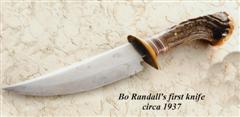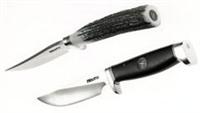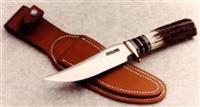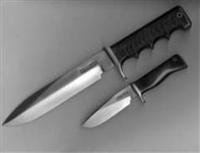Please permit me to share some thoughts on what strikes me as being “the elephant in the room” regarding the discussion on this thread.
Nothing in this comment is, nor is it intended to be, legal advice. Nothing in this comment is, nor is it intended to be, an accusation, allegation or assertion of any crime and/or any malfeasance or impropriety.
Has any consideration been given to the potential ramifications of the pictured knife being confirmed as one of the “raspy voice dude” or similarly described blades? If so confirmed, then it may be possible that the knife could, depending upon the law of the state/local jurisdiction, be classified as stolen property. Such a classification could potentially give rise to both criminal and civil law concerns.
From a criminal law perspective, under the penal code of most states, possession of what is alleged or known to be stolen property may result in criminal charges/allegations being filed (which is certainly not the same as a conviction, but who needs the time, expense and grief?). Whether this could occur depends upon numerous factors, including, among others, whether the possessor knew or knows that the property was stolen, and the possessor’s intent in taking possession of the property. The laws of the state/local jurisdiction should be reviewed, or a local attorney should be consulted, to determine potential concerns regarding any particular circumstances.
From a civil law perspective, under the common or commercial law of most states, RMK, as the original owner of the stolen blades, retains its ownership interest in them, and has the right to recover its previously stolen property. This is expressed in the legal rules "Nemo dat quod non habet" ("He who hath not, cannot give") and "Nemo plus iuris ad alium transferre potest quam ipse habet" (“No one can transfer more right to another than he has himself”). Translations/definitions from Black's Law Dictionary. By way of example, consider the lawsuits filed to recover art and other personal property stolen/looted by the Nazis during WWII and the Holocaust. These recovery lawsuits were often filed by the original owners (or their descendants) under these, or similar, laws/rules/legal concepts.
In short, these civil laws/rules mean that a thief has no valid title or right in, or to, what he stole, and so he cannot sell or transfer valid title to the item. Conversely, a buyer of a stolen item obtains physical possession only, and does not purchase ownership title or right in or to the item. Put another way, the buyer can't buy what the seller never had to sell (which for stolen goods is valid title or ownership right). These rules usually apply even if the buyer is an 'innocent' purchaser (also known as a "bona fide" purchaser), meaning one who doesn't know that the item was stolen, or that the seller had no right to claim ownership of the item. Many states/jurisdictions provide for exceptions to these rules for a bona fide purchaser, often providing him/her recourse against the seller of the item (though usually not against the original 'rightful' owner from whom the property was stolen). Again, the laws of the state/local jurisdiction should be reviewed, or a local attorney consulted, to determine potential concerns regarding any particular circumstances.
While I appreciate the knowledge and information shared on this thread, given these circumstances and the possible ramifications, certain comments made in a public forum discussion may not be the wisest course of action.
Just some food for thought...
Bob
_________________________
Bob Carlin
rfcarlin@hotmail.com
RKCC #622













